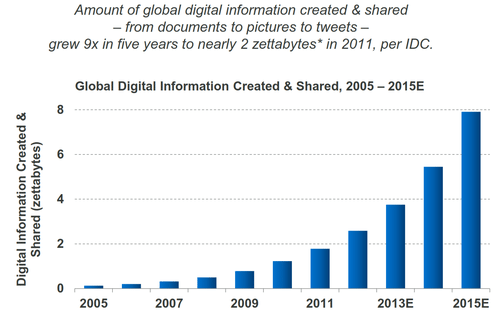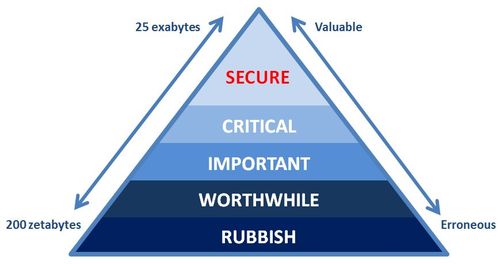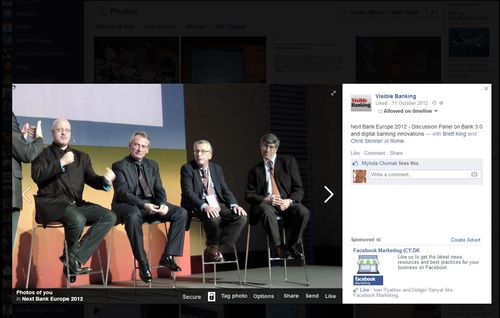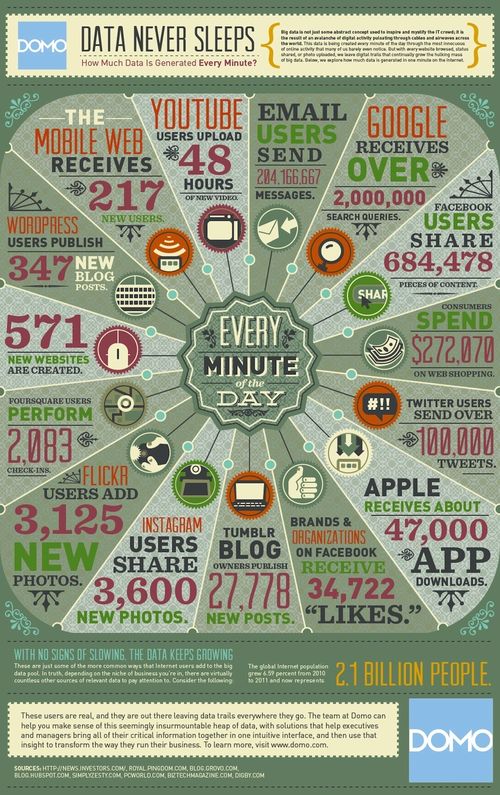
I gave a presentation the other day and, as usual, concluded
that banks should position themselves as data vaults. One person then asked: what data should a bank make secure? which is a good question to
ask, as it led to a healthy debate and improvement of clarity of view.
Today, we produce exabytes of data every hour. How much data? Well, it’s hard to quantify as the data
explosion of the last decade is so immense, but this slide gives you a good
idea:

This slide is taken from IDC’s research “Extracting Value from
Chaos”, sponsored by EMC,
and a presentation by Mary Meeker on key internet trends.
This slide shows that, from 2005 to 2011, the
amount of information being created and shared rose ten-fold to almost 2
zetabytes (2 trillion gigabytes), and is increasing every day.
Now not all of that
information is that critical. Some is
erroneous, some transient, some time dependent and so and so forth.
For example, and just
to put this in perspective:
- There
are 2.2 billion email users worldwide sending 144 billion emails every day of
which 61% are considered non-essential and 68.8% is spam;
- There
are now almost 1 billion websites with 87.8 million on Tumblr alone, and the average
web page became 35% bigger during 2012 (thanks to photos, videos, etc);
- There
are over a billion monthly active users on Facebook (posting monthly)
with Brazil the most dynamic country on Facebook, where 85,962
items are posted every month;
- Facebook
adds 7 petabytes of data every month for photo content alone;
- There
are over 200 million monthly active users on Twitter, posting 175
million tweets sent every day throughout 2012;
- There
are 6.7 billion mobile subscriptions and around 5 billion mobile phone users
generating 13% of global Internet traffic or around 1.3 exabytes of data each
month (59% of it is video).
Figures courtesy of
Pingdom
So I’m going to take a pop at this mountain of data and say
that data is increasing at around 2 zetabytes a year today, of which 65% is
redundant data, e.g. spam and transient.
That leaves around 665 exabytes that has some value.
Some of this is important but not critical, and some worthwhile
but not that important. Using the third
to two-thirds dynamic, this would mean that around 220 exabytes is important
and 70 exabytes critical.
It is this last category that may be leaked by Wikileaks, so
that’s the stuff that people want to secure.
It is here that banks can make their data vault offer.
Secure data with the bank and pay for that security.
You would probably find that although people may feel their
data needs to be secured because it’s critical, only a third would pay for that
security, so now we have our figure: 20 to 25 exabytes of data per year is the
sort of data that people would secure and pay for.

How much do they pay?
Well, what’s it worth to secure those photo albums you currently
post on Facebook of your child being born and its early years?
How much would you pay to backup your twitter account?
What is the value of those emails confirming your contracts
over the last year?
How much would you pay to keep your Bitcoin account secure?
All of this is data that currently relies on the organisation
or the individual to secure, but the bank could secure that data for a fee, as
much of the above has the same value as money for the individual or
organisation concerned.
And how would it work?
It would work by downloading a bank offered app that, once
installed, allows you to tag any data with a padlock (see bottom of photo, doubleclick to enlarge).

That padlock tag moves that data into the
bank vault, where it is secured. If you
ever then lose that data, your disk gets wiped, you accidently delete it, your
Facebook account is corrupted, your backup is destroyed … you can guarantee to
get it back from the bank vault.
That is the bank’s guarantee, and that has value.
How much?
That’s up to how much the individual wants to pay.
Like an insurance policy, if you value your data at £1 million,
then you pay the bank an insurance premium for the bank vault’s guarantee. Let’s say it’s around £250 ($400) a year for
secure, backed up and defended or £100 a year for secure and backed up.
£250 a year for a guarantee that the tweets, posts, updates,
blogs and stuff you produce is guaranteed to be secure and backed up, or secure
and defended. I imagine quite a few
folks would pay for that:
- Google averages 2 million searches per minute;
- Facebook users post 684,478 pieces of content
per minute; - Twitter users average over 100,000 tweets per
minute; and - $272,070 is spent online every minute.

Infographic stolen from
Mashable
Of course, a bank does not necessarily need to make this
offer of course. Google could. Or Facebook.
And, if they did, maybe they could offer to look after your money too.
Chris M Skinner
Chris Skinner is best known as an independent commentator on the financial markets through his blog, TheFinanser.com, as author of the bestselling book Digital Bank, and Chair of the European networking forum the Financial Services Club. He has been voted one of the most influential people in banking by The Financial Brand (as well as one of the best blogs), a FinTech Titan (Next Bank), one of the Fintech Leaders you need to follow (City AM, Deluxe and Jax Finance), as well as one of the Top 40 most influential people in financial technology by the Wall Street Journal's Financial News. To learn more click here...

